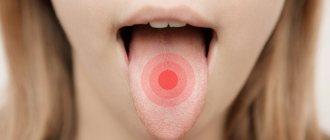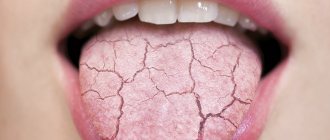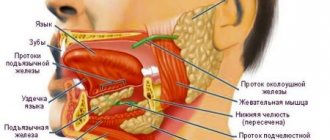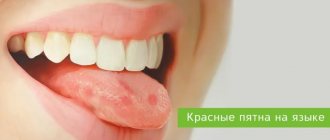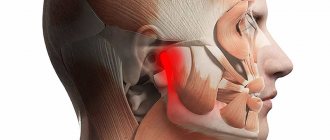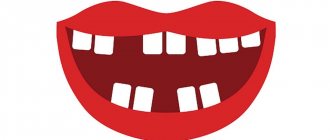Vincent's ulcerative necrotizing stomatitis
One of the reasons that the tongue hurts on the side is Vincent's ulcerative necrotizing stomatitis. With this disease, ulcers appear in the oral cavity, which can be located not only directly on the tongue, but also on the mucous membrane of the cheeks, and even spread further:
- on the gums;
- sky;
- tonsils.
The disease is caused by bacteria: spirochetes and fusobacteria. What is especially characteristic of this pathology is that the ulcers are covered with a dirty gray coating. Vincent's ulcerative-necrotizing stomatitis is treated locally with antimicrobial drugs. Broad-spectrum antibiotics are also prescribed.
Stomatitis: features of the disease
Stomatitis is a disease related to dental pathologies in which inflammation of the oral mucosa occurs. Infection of the tongue with stomatitis in adults is also called “glossitis.”
The inflammatory process affects the mucous membrane and causes severe symptoms:
- redness and swelling of the tongue;
- formation of white plaque;
- severe pain;
- the formation of many small blisters and ulcers.
Due to severe sensitivity and soreness of the tongue, the patient cannot eat food, fever, insomnia and irritability are possible.
Stomatitis under the tongue in adults, as in other parts of the oral cavity, is classified into two types.
- Aphthous. A form of inflammation in which the tongue becomes covered with papules and ulcers that turn into erosions (aphthae).
- Herpetic. The inflammatory process is manifested by swelling and redness of the tongue. Small bubbles are localized in groups.
Prosthetic stomatitis and ulcerative-necrotic form of pathology are extremely rare.
Without treatment, the signs of stomatitis completely disappear, but this does not mean that the patient is cured of the pathology. The inflammatory process becomes chronic and when the immune system is weakened or exposed to an irritant, a relapse occurs.
Tongue injuries
Another reason why the tongue hurts on the side lies in mechanical injuries to the organ. They occur when eating food with sharp parts (seeds, nuts, undercooked cereals), hitting, or biting. Damage can occur due to a seizure, sports, falls, or various accidents.
If you are absolutely sure that the soreness is the result of an injury, then you just need to give the tongue time to recover. Nevertheless, examination by a specialist to clarify the diagnosis and treatment will not be superfluous.
Other reasons
- Avitaminosis.
A deficiency of microelements can cause sensitivity of the mucous membranes and the appearance of cracks in the tongue. - Allergy.
New dental care products and foods can cause increased sensitivity of the gums and tongue. - Worms.
The presence of parasites leads to the fact that the body does not absorb nutrients and beneficial microelements, which causes the condition of the mucous membrane to worsen. - Hormonal disbalance.
- Stress.
How to determine health status by language. Source: Yulianna Pliskina YouTube channel
Glossitis
Glossitis
is an inflammation of the tissues of the tongue, manifested in its soreness, changes in color and structure, and the appearance of a dense coating. There is a burning sensation, hyperemia (overflow of blood vessels), food loses its taste, and salivation increases.
If the doctor has diagnosed the patient with glossitis, then the next step is to find out whether this indicates a pathology of other organs. This could be a herpes virus, poisoning with heavy metal salts, etc. Treatment is prescribed depending on the initiating cause, trying to exclude it. It usually includes local antiseptic therapy.
What is “bad bite”
Bite (or occlusion) is the closing of the jaws at the moment of their natural compression. The standard is considered to be central occlusion, in which the number of points of contact between the teeth of the upper and lower jaws is maximum.
But all other options for interaction of the jaws when closing are malocclusions. Today it is customary to identify the main forms of malocclusion:
- open: there is no tight closure of the dentition
- cross: the antagonist teeth of the upper and lower jaws overlap each other with segments (in one area the lower ones overlap the upper ones, in the other - vice versa)
- mesial: the lower jaw protrudes forward, the upper teeth overlap the lower ones
- distal: the upper row of teeth is pushed forward, overlapping the lower one,
- deep: a type of distal bite when the upper jaw almost completely hides the lower teeth.
Contrary to the opinion of many people who believe that malocclusions are not a cause for concern, you should know: malocclusion of any form in most cases causes dental problems, and sometimes problems of a different nature.
The absence of several teeth and loose jaw closure can provoke:
- deterioration of the gastrointestinal tract;
- frequent headaches;
- development of facial asymmetry;
- premature appearance of facial wrinkles.
An incorrect primary bite can affect the growth of permanent teeth and lead to even greater deformation of the jaw system.
And very often, malocclusions cause permanent injury to the mucous membrane, including a strong bite of the tongue and the inner surface of the cheek. And the presence of open wounds in the oral cavity is a direct path to infection and the development of inflammation.
Don’t leave the problem unattended, contact your orthodontist on time!
Catarrhal glossitis
If the tongue hurts on the side and a white coating covers its surface, then this is most likely catarrhal glossitis - a special case of this disease. It can be considered as a symptom of other pathologies. In particular, it is called:
- caries;
- stomatitis;
- gastrointestinal diseases;
- various infections (measles, diphtheria, etc.).
In addition to pain and plaque, symptoms of catarrhal glossitis include swelling of the tongue and a burning sensation, which is especially worse after eating or talking. The disease is treated by eliminating its causes and rinsing the mouth with antiseptic solutions.
General recommendations
For stomatitis in adults, treatment is carried out on an outpatient basis. The dentist can perform initial treatment of the oral cavity, then the patient will need to perform all the manipulations independently at home.
Antiseptic treatment of the entire oral cavity is a prerequisite for the successful treatment of stomatitis and the rapid recovery of the affected mucosa. For “disinfection”, solutions containing chlorhexidine, furatsilin or metronidazole are used. Dentists also recommend rinsing with a soda solution every 2-3 hours.
Locally in the affected areas, it is necessary to remove heavy plaque using gauze and apply anti-inflammatory and regenerating gels or ointments to the areas where ulcers accumulate. The procedure is unpleasant, but significantly speeds up recovery.
Treatment of stomatitis on the tongue in adults, subject to all prescriptions and recommendations of the dentist, takes no more than 10 days. Symptoms of the disease disappear after 3–5 days; a few more days are required to restore the affected tissues.
Inflammation of the salivary glands
This disease is called sialadenitis. Any salivary glands can be affected by it, but painful sensations in the tongue, closer to the base, occur if the sublingual gland is affected. Pathology is caused by viruses or bacteria. Symptoms of sialadenitis include:
- pain at the base of the tongue;
- the formation of a compacted swelling underneath;
- decreased salivation.
How to treat the disease if the tongue hurts on the side precisely for this reason? Antibacterial and antiviral drugs.
Causes of pain in the tongue
13.09.2021
Pain in the tongue can occur for a variety of reasons, and describing them all is difficult. But still, let's try to sort out the most
the main sources of its occurrence, because depending on the cause of the pain, its nature and location, proper treatment is prescribed.
The most common causes of tongue pain include:
• mechanical damage; • inflammatory processes in the oral ; • blockage of the salivary glands; • neuralgia ; • allergies ; • oncological diseases.
The tip of the tongue hurts
It is not always necessary to resort to drug treatment for pain in the tongue, so let's take a closer look at the main
the reasons for its occurrence. For example, symptoms of mechanical injuries are: pain on the tip of the tongue, edge or sides.
In most cases, such damage occurs while eating. The most common sources of origin of these microtraumas include:
• burns from hot food or drinks; • biting with your own teeth ; • scratches or cuts that appear from certain foods; • injuries caused by sharp edges of poor quality fillings.
Therefore, for example, if pain occurs in the tip of the tongue, there is no need to worry too much right away. Most likely it arose as a result of a trivial mini-trauma,
for example, such as a burn or accidentally biting your tongue.
Despite the unpleasant sensations resulting from such injuries, they do not require special treatment and go away on their own, without any negative consequences.
consequences. But it also happens that seeking medical help is still necessary. For example, when painful inflammatory processes appear in
oral cavity , such as: glossary, glossitis and stomatitis.
Pain under the tongue
The localization of pain in inflammatory diseases of the tongue may be at its base. For this reason, pain also occurs under the tongue. There may be pain
concentrated in one place, or move throughout the entire oral cavity.
Such discomfort can also be caused by one of the following diseases:
• allergies ; • gastrointestinal disease; • vitamin deficiency.
If you experience severe pain, excessive salivation, bad breath , swelling of the tongue, which makes speech and breathing difficult, you should
pay attention to such dangerous diseases as abscess or phlegmon . With these diseases, the listed symptoms are accompanied by problems with closing the mouth .
The above diseases are a serious reason to consult a doctor , who, after making a correct diagnosis, will prescribe appropriate treatment,
depending on the causes and nature of the pain.
The base of the tongue hurts
If pain bothers you in the area of the lateral surfaces of the tongue, then in addition to mechanical damage, the following factors can also be its causes:
Smoking can often cause severe pain in the tongue; neuralgia - you should think about it if you do not smoke and have not noticed mechanical
damage, but the pain in the tongue still continues.
Above, we have listed the most common causes of tongue pain, now let’s move on to ways to eliminate this ailment.
Troubleshooting
As already mentioned, if your tongue hurts severely, the first thing to do is seek medical help. Doctors dealing with diseases
oral cavity specialists are an otolaryngologist and a dentist . During the examination, a specialist will exclude possible mechanical damage and determine the main cause.
the occurrence of pain, as well as the nature of its course. Then he will make a diagnosis and determine the required treatment.
Compliance with hygiene rules will help to minimize the risk of inflammatory processes in the mouth , such as: do not neglect hand washing;
do not eat unwashed fruits and vegetables; rinse your mouth after every meal. Also, it is necessary to give up bad habits and constantly
monitor the condition of your teeth . Let us remind you that following these simple rules will help you in the fight for oral health .
Published in Articles without category Premium Clinic
Symptomatic features of pain under the tongue
Pain in the sublingual area can have various symptomatic manifestations. First of all, they are accompanied by different types of pain (sharp, aching, throbbing), as well as constancy or frequency.
If you consult a doctor, it is very important to correctly characterize the pain - this will allow the specialist to narrow down the range of symptoms for differential diagnosis. For example, you may have pain in the frenulum under your tongue or pain under your tongue on the right/left.
One of the characteristic manifestations of stomatitis or candidiasis is a white pimple under the tongue. Its presence may indicate the development of a fungal or bacterial process. If such a symptom is detected, treatment will include antifungal and antibacterial therapy with the prescription of antibiotics or special antiseptic rinses. The presence of pimples of a different color may indicate the presence of a wide range of problems, the identification of which requires a thorough diagnosis of the oral cavity or the entire body.
Signs of deviations from the normal state of the tongue
It is quite possible that, once you look at your tongue, you will see a rather unsightly picture. Symptoms of deviation from the norm:
- A coating of various colors, thicknesses, and with different locations of spots appears on the back of the tongue;
- The sides of the tongue are bright red;
- The taste buds look uneven, some of them increase in size and begin to disturb with unpleasant sensations, taste sensations change, their intensity weakens;
- The oral cavity becomes unusually dry;
- In some cases, the appearance of pain and burning is diagnosed;
- There is an unpleasant odor from the mouth;
- After cleaning the tongue, the plaque appears again after a short time.
In the plaque that appears on the tongue, laboratory testing can reveal leukocytes, pathogenic microflora, and exfoliated epithelial cells.
This video will tell you about plaque on the tongue due to gastritis:
How to speed up wound healing
All wounds heal sooner or later - this is understandable, but the duration of healing largely depends on your actions. How to behave so that the injured mucous membrane heals as quickly as possible and without consequences? Some valuable tips for this case:
- pay increased attention to oral hygiene - this will help avoid infection of an open wound (regular brushing of teeth, careful removal of food debris and bacterial plaque);
- observe the temperature regime, avoid excessively hot or chilled foods for a while: cold is good only as an emergency measure, but subsequently it slows down the healing process; hot food and drinks both irritate and injure damaged tissues;
- use external antiseptics (sprays, ointments, lozenges): the pharmacist at the pharmacy will help you with the choice, ideally you should consult a doctor;
- rinse your mouth with decoctions of medicinal herbs: the best for these purposes are chamomile and St. John's wort;
- increase the proportion of foods with vitamins B and C in your diet, which promote wound healing; To heal scratches on the mucous membrane, use ascorbic acid.
Use the advice of traditional medicine with caution: rinsing with medicinal decoctions is not so harmless, you can resort to their help only with the permission of a doctor!

